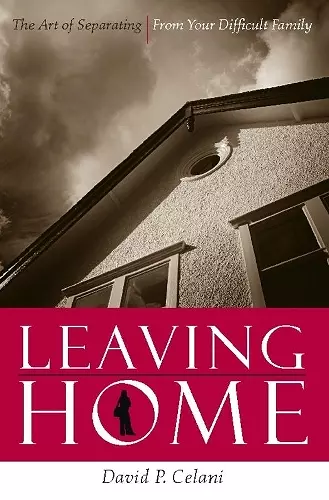Leaving Home
The Art of Separating from Your Difficult Family
Format:Paperback
Publisher:Columbia University Press
Published:23rd Sep '11
Currently unavailable, and unfortunately no date known when it will be back

Relinquishing family attachments that failed to meet childhood needs is the most difficult task individuals can undertake as they grow into adulthood. Leaving Home not only emphasizes the life-saving benefits of separating from toxic parents but also offers a viable program for personal emancipation. David P. Celani centers his program on Object Relations Theory, a branch of psychoanalysis developed by Scottish analyst Ronald Fairbairn. The human personality, Fairbairn argued, is not the result of inherited (and thus immutable) instincts. Rather, the developing child builds internal relational templates rooted in conscious and unconscious memories he internalized in childhood, and these guide his future interactions with others. While an attachment to neglectful or even abusive parents is not uncommon, there is a way out. Eloquent, relatable, and filled with rich examples taken from more than two decades of clinical practice, Leaving Home outlines the practical steps necessary to become a healthy adult.
Why, after a childhood of emotional neglect and abuse, would a man move next door to the very parents who caused him pain? And how can a woman emerge from her mother's control in order to form healthy adult relationships? Giving up family attachments that failed to meet our needs as children, David Celani argues, is the hardest psychological task an adult can undertake. Yet the reality is that many adults re-create the most painful aspects of their early relationships with their parents in new relationships with peers and romantic partners, frustrating themselves and discouraging them from leaving their family of origin. Leaving Home emphasizes the life-saving benefits of separating from destructive parents and offers a viable program for personal emancipation. Celani's program is based on Object-Relations Theory, a branch of psychoanalysis developed by Scottish analyst Ronald Fairbairn. The human personality, Fairbairn argued, is not the result of inherited (and thus immutable) instincts. Rather, the developing child builds internal relational templates that guide his future interactions with others based on the conscious and unconscious memories he internalized from his primary relationship-the one he experienced with his parents. While a child's attachment to parents who were neglectful or even abusive is not uncommon, there is a way out. Articulate, sensitive, and replete with examples from Celani's twenty-six years of clinical practice, this book outlines the practical steps to leaving home.
Dr. David Celani meaningfully, forcefully, and poignantly confronts one of the most common pschyo-social issues of our time and of times past: the plight of the dysfunctional family and the attendant paradox of their offspring being unable to separate from them in adulthood to live their own lives. Dr. Celani beautifully addresses this problem and offers valuable guidelines for its sufferers. This work is highly recommended for all mental health professionals. -- James Grotstein, M.D. Full of compassion encouragement, this book will prepare readers to leave home and to live a life free of interpersonal failures. Library Journal Ambitious... The writing is straightforward and agreeable. -- Harriette Kaley PsycCRITIQUES Sophisticated and challenging... This book offers guidance and encouragement without the watered-down platitudes found elsewhere. -- Paul Efthim New England Psychologist
ISBN: 9780231134774
Dimensions: unknown
Weight: unknown
176 pages